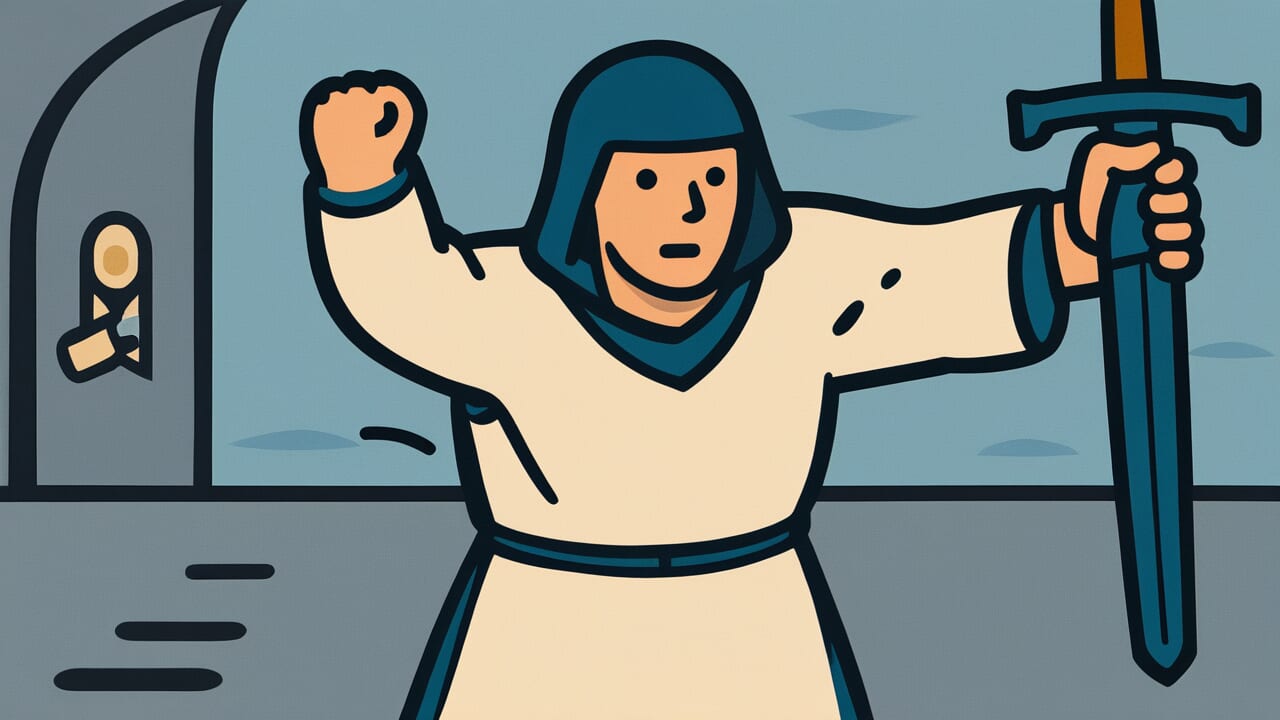How to Read “Those who use the sword die by the sword”
Tsurugi wo tsukau mono wa tsurugi de shinu
Meaning of “Those who use the sword die by the sword”
This proverb means that those who use violence will be destroyed by violence. It teaches the principle of karma: people who try to control others through force or violence will eventually face the same fate.
This saying is used as a warning to people who try to solve problems through violent means. It also serves as a caution against those who abuse their power.
The proverb appears in contexts about stopping cycles of revenge. Even if someone gains temporary advantage through force or intimidation, this is not a sustainable solution. It will inevitably invite counterattack or retaliation.
Today, “Those who use the sword die by the sword” applies beyond physical violence. It includes verbal abuse, power harassment, and all forms of control through force.
The proverb expresses a universal truth: those who choose to hurt others will ultimately be hurt in the same way.
Origin and Etymology
This proverb is believed to come from the Bible’s New Testament, specifically the Gospel of Matthew. When Jesus was arrested, his disciple Peter drew his sword and cut off the ear of the high priest’s servant.
Jesus told Peter, “Put your sword back in its place, for all who draw the sword will die by the sword.” This teaching became the foundation of the proverb.
This teaching spread worldwide as a universal truth about the cycle of violence, not just within Christianity. It was introduced to Japan during the Meiji period and later, when Western thought and literature entered the country. It then became established as a Japanese proverb.
Interestingly, this teaching resonates with Eastern philosophy. It connects with Buddhist concepts of karma and traditional Japanese warnings like “Curse someone and dig two graves.”
The insight that violence breeds more violence and ultimately leads to self-destruction has been accepted as wisdom common to all humanity, transcending culture and religion.
In Japan, it became especially linked with the spirit of bushido. It came to be understood as teaching that true strength means not relying on violence.
Usage Examples
- That dictator was eventually overthrown by a popular uprising. Truly, those who use the sword die by the sword.
- If you try to solve things with violence, those who use the sword die by the sword—it will come back to you someday.
Universal Wisdom
The universal truth in this proverb lies in the inherently self-destructive nature of violence. Why have people passed down this teaching for thousands of years? Because they have repeatedly witnessed the terrible chain reaction that violence creates.
Violence seems like the quickest way to solve problems. If you force someone to submit through power, you appear to get immediate results. But here’s where fundamental human nature comes in.
When people’s dignity is hurt, they never forget. Humiliation is carved deep in the heart, waiting for a chance to strike back.
History shows how fragile power built on violence really is. Even if you make people obey through fear, the moment that fear fades or power shifts, suppressed anger explodes.
Violence calls for violence, and revenge breeds new revenge. This chain continues forever unless someone has the courage to stop it.
What this proverb shows is the law of karma in the universe. What you give to the world will always return to you in some form.
This is both a moral teaching and a cold reality of human society. That’s why our ancestors kept passing this wisdom to future generations.
When AI Hears This
Those who use the sword die by the sword because they fall into what game theory calls “the dominant strategy trap.” A dominant strategy is the choice that benefits you most, no matter what your opponent does.
If the sword is the strongest weapon, choosing it seems rational for everyone. But here’s the trap.
The moment you choose the sword, your strategy becomes completely visible to your opponent. They know that countering a sword user with a sword is most efficient. So by choosing the strongest weapon, you make your actions predictable.
This has the same structure as the prisoner’s dilemma. When both sides do their best, they reach the worst equilibrium where they hurt each other.
Even more interesting is how unstable this equilibrium is. In a duel between sword users, a tiny difference in skill or a moment’s misjudgment can be fatal.
In game theory, when opponents use the same strategy, their win rate approaches 50 percent. Even a master swordsman has about a 50 percent chance of losing to another sword user.
Having the strongest weapon actually becomes a magnet that attracts the strongest enemies. Rational choice creates copies of yourself, ultimately maximizing your risk of self-destruction. This is the ironic result of the dominant strategy.
Lessons for Today
What this proverb teaches you today is what true strength really means. Aggressive words on social media, power harassment at work, intimidating attitudes at home—modern society has many forms of “swords.”
What matters is not giving in to the temptation to force your way through problems. Sure, you might silence someone with strong words. But does that really solve the problem? What remains in their heart is not understanding, but resentment.
Real solutions come from dialogue and understanding. Not defeating the other person, but finding answers together. This method may take time. But relationships built this way are sustainable, and you won’t get hurt either.
When you feel like drawing your “sword” against someone today, pause for a moment. Ask yourself: will this action benefit me in the long run? The courage to break the cycle of violence is true strength.



Comments